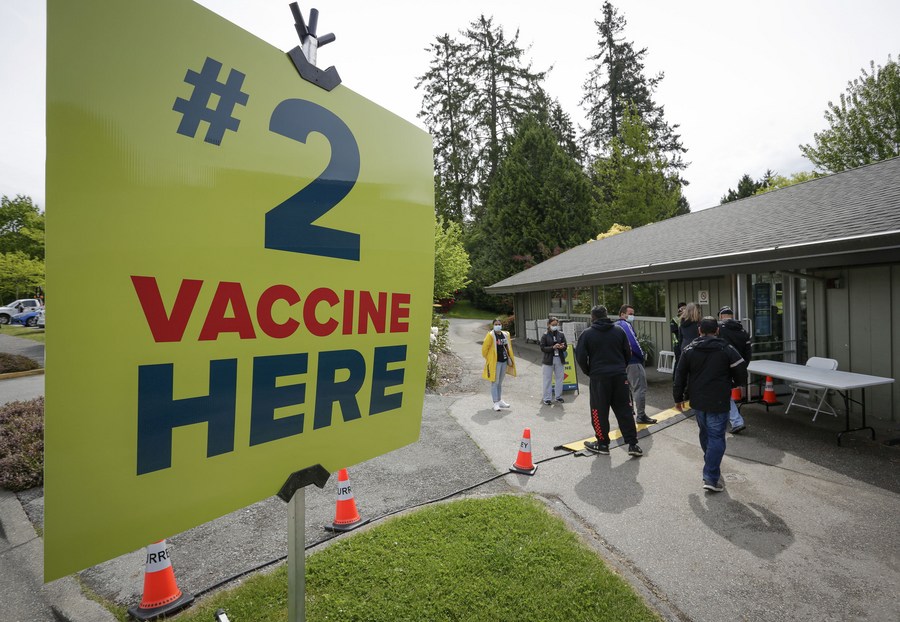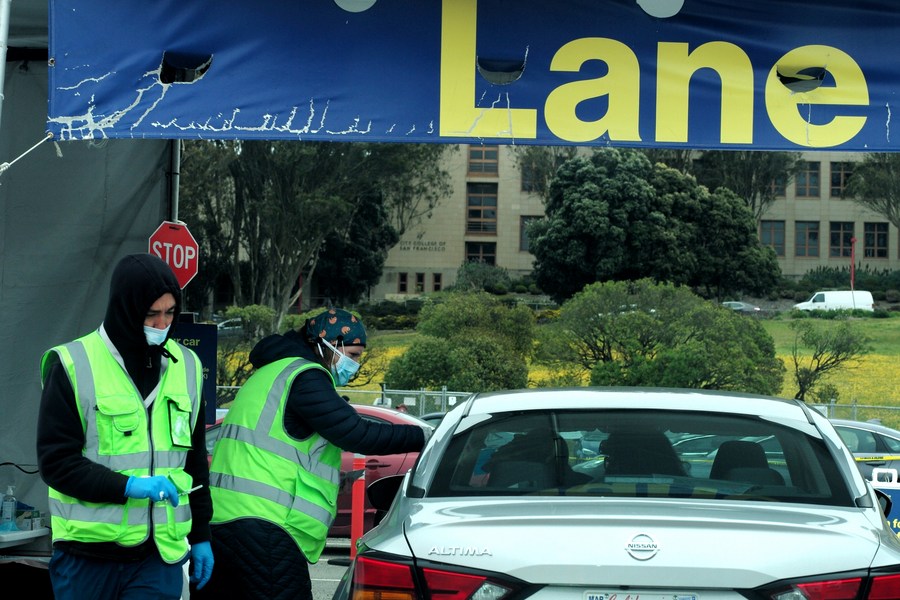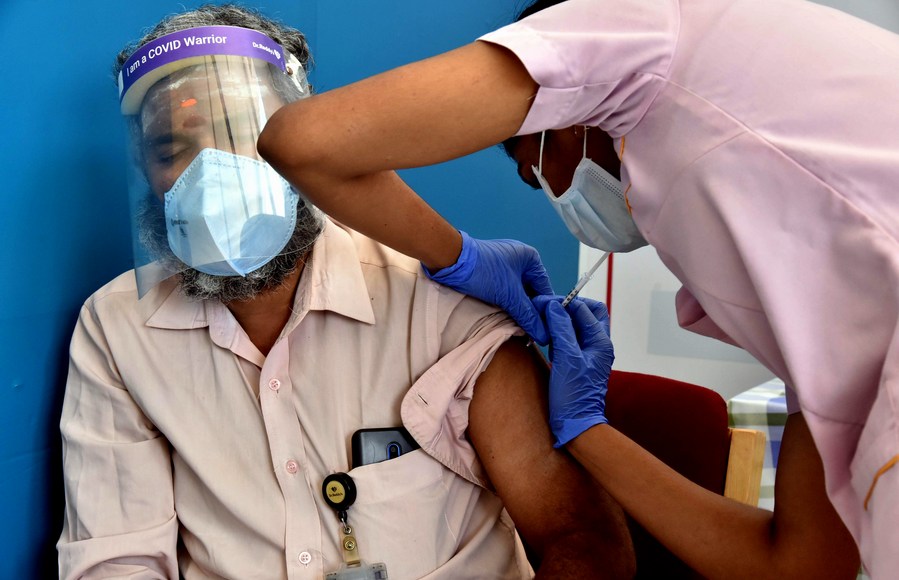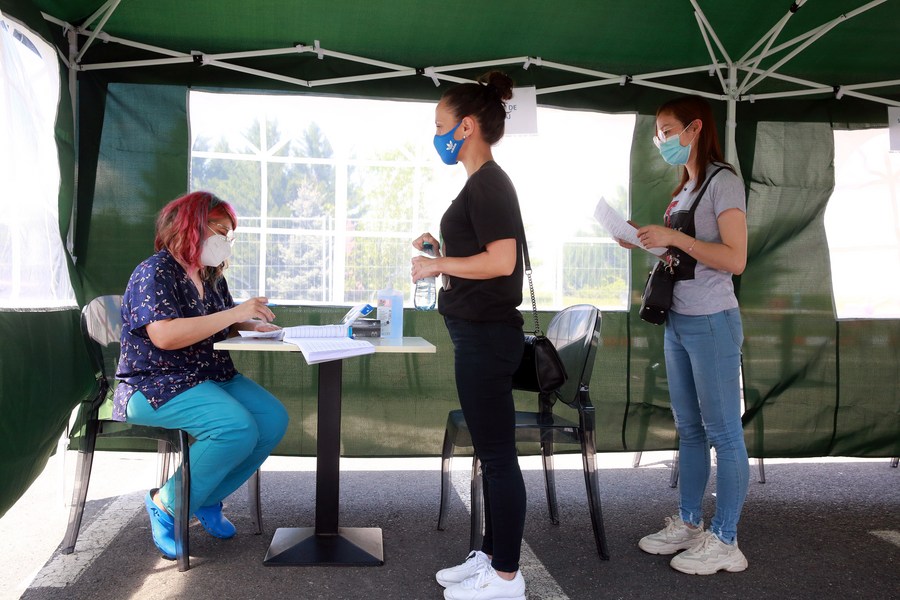
People wait for vaccination at a pop-up vaccine clinic in Surrey, British Columbia, Canada, on May 17, 2021. (Photo by Liang Sen/Xinhua)
How did vaccinations go in countries and regions worst hit by the epidemic?
BEIJING, May 18 (Xinhua) -- COVID-19 vaccines have been developed and rolled out to confront the ravaging pandemic, while obstacles, including short supply, inaccessibility and scepticism, still haunt the world.
Here's how vaccinations go in countries and regions worst hit by the epidemic.
THE UNITED STATES
As of Monday night, more than 32.9 million confirmed COVID-19 cases and 586,359 deaths have been reported in the United States, the most of any country, according to Johns Hopkins University.
More than 123.8 million people accounting for 37.3 percent of the country's population have been fully vaccinated, according to the U.S. Centers for Disease Control and Prevention (CDC). The U.S. Food and Drug Administration (FDA) on May 10 authorized the emergency use of the Pfizer-BioNTech COVID-19 vaccine in adolescents aged 12 to 15.

People get inoculated with COVID-19 vaccines at a drive-through vaccination site at the City College of San Francisco, the United States, April 29, 2021. (Xinhua/Wu Xiaoling)
The CDC Thursday eased restrictions for the fully vaccinated, saying that they don't need to wear masks everywhere, and added Sunday that "this is not permission for widespread removal of masks."
The vaccination is slowing though the country has tried many ways, including encouraging the unvaccinated with free beer and sports tickets, according to several U.S. media.
Americans' "vaccine hesitancy" is thought to be the biggest threat to ending the pandemic, according to a survey involving 723 epidemiologists published Saturday by The New York Times. A separate report by the newspaper said that difficult access to vaccines hinders those who want to get jabbed.
The survey said that only when at least 70 percent of Americans of all ages are vaccinated will "the true end of the pandemic" arrive.

A health worker administers a dose of Sputnik V vaccine to a man at a hospital in Hyderabad, India on May 17, 2021. (Str/Xinhua)
INDIA
India has seen its new cases drop recently after a hike in the country's second wave of the pandemic, amid a shortage of essential medical supplies including medical oxygen.
As of Monday afternoon, more than 24.9 million infections have been confirmed and 274,390 people died in India, according to data from the World Health Organization (WHO).
More than 184 million vaccine doses have been administered across the country since the beginning of the vaccination drive in January this year, according to the Ministry of Health and Family Welfare of India.
The third phase of the vaccination for people aged 18 and above began on May 1, but is yet to start in many places or is going on at a slower pace due to a severe shortage of vaccines. Reports pouring in from many states said that people are being turned away at vaccination centres because of the shortage.
Coomi Kapoor, consulting editor of the Indian Express newspaper, wrote Monday that the government's sluggish plan for vaccine production and unreasonable pricing, which "crushes" vaccine manufacture in India, have led to the shortage.
The ongoing COVID-19 lockdown in India's New Delhi has been extended by a week further till May 24, Chief Minister Arvind Kejriwal said Sunday, adding that COVID-19 cases were showing a downward trend in Delhi and people were recovering from the infection.

Sao Paulo State Governor Joao Doria receives a dose of COVID-19 vaccine developed by Chinese pharmaceutical company Sinovac in Sao Paulo, Brazil, on May 7, 2021. (Photo by Rahel Patrasso/Xinhua)
BRAZIL
As of Monday night, Brazil has more than 15.6 million confirmed cases, the third most in the world, and 436,537 deaths, the second most, according to Johns Hopkins University.
The South American country is experiencing a new wave of infections, which has resulted in an increase in cases and deaths as hospitals are overwhelmed by COVID-19 patients.
Around 16.8 percent of the country's population have been vaccinated at least one dose, according to the latest data collated by the University of Oxford-based Our World in Data.
The country is facing a vaccine shortage. Between 1.5 and 2.5 million Brazilians have not taken their second doses with the recommended interval, and experts worry that this could compromise the efficacy of vaccination efforts, according to the local media outlet The Brazilian Report.
The Brazilian government said on May 11 it would inoculate the country's Olympic and Paralympic athletes using COVID-19 vaccines donated by China's Sinovac and U.S. firm Pfizer.
The government has been criticised for failing to secure more vaccines. Brazil's Senate opened an inquiry into the government's handling of the pandemic in late April.
In a survey involving 2,071 people published Monday, 49 percent say they support the impeachment of President Jair Bolsonaro, which reflects "the government's weariness with the COVID-19 pandemic," according to the Brazilian newspaper, Folha de S.Paulo.

People wait to receive the COVID-19 vaccine at a vaccination center in Romania's largest Chinese commodity wholesale market near the northeastern suburb of Bucharest, on May 17, 2021. (Photo by Gabriel Petrescu/Xinhua)
EUROPE
Europe has more than 53.6 million confirmed cases as of Monday afternoon, which is the second most among WHO regions, following Americas, according to data from the WHO.
France with more than 5.7 million confirmed cases is among the hardest-hit countries in the world, following the United States, India and Brazil.
Around 31.5 percent of the European Union (EU) population have received at least one dose of COVID-19 vaccines, according to Our World in Data.
The region has seen vaccine hesitancy, too. Over a quarter of adults in the EU said that they were "very unlikely" or "rather unlikely" to get vaccinated, according to a survey published by Eurofound on May 10. The main reason is the lack of trust in the safety of the vaccines.
The survey indicates an east-west divide. The intention to get vaccinated is over 60 percent for western EU member states except Austria and France, while among eastern EU countries, people are generally less willing.
"It is clear that there is a need for clear political and scientific communication about vaccine safety. The risk is that an unclear political stance about vaccines and a less than straightforward communication over their safety may have a detrimental effect on public trust in vaccines and could foster vaccine hesitancy," said the survey. ■




